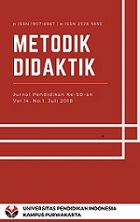Teachers' Professionalism and Students' Learning Interest in Improving Students' Intelectual Intelligence in Elementary Schools in Pandeglang County
Abstract
This research is conducted under a fact that there is an irrelevant issue among expectation, process, and result achieved in the education. Therefore, teachers’ professionalism is highly needed to run teaching and learning activities.
The purposes of this research are to 1) investigate to what extent teachers’ professionalism and students’ learning motivation can improve intellectual intelligence of the students in elementary schools in Pandeglang County, 2) investigate teachers’ efforts in improving intellectual intelligence of the students in the aforementioned schools.
The method used in this research is descriptive method with qualitative approach. Meanwhile, the data source is gotten from an informant as a research subject with literature research and field research as data collection techniques by doing observation, documentation, and interview to some informants including teachers, students, and the schools’ headmasters. Next, the data isanalyzed carefully.
The data show that teachers’ professionalism and students’ motivation to improve the intellectual intelligence of the students in the aforementioned schools still cannot be categorized as professional. It can be proven by the research findings where the students’ reading interest is still low. Data from 4 schools show that around 32.18% students are illiterate.
The above-mentioned thing is a factor which dominates the lack of teachers’ professionalism in improving the students’ intellectual intelligence during the teaching and learning processes. It includes lack of teaching method, strategy, and skill. Therefore, the condition fails to trigger and stimulate the students’ learning interest. As a result, it can be concluded that the teacher’s professionalism is considered as less professional.
Keyword
Teacher’s Professionalism, Student’s Learning Interest, Student’s intellectual intelligence
Full Text:
Hal 31-43References
Alma, Buchari. 2012. Guru Professional Menguasai Metode dan Terampil Mengajar. Bandung: Alfabeta.
Arikunto, Suharsimi. 2013. Prosedur Penelitian. Jakarta: Rineka Cipta
Baharuddin. 2010. Pendidikan & Psikologi Perkembangan. Cetakan Ke-2. Jogjakarta: Ar-Ruzz Media.
Danim, Sudarwan. 2017. Profesionalisasi dan Etika Profesi Guru. Bandung: Alfabeta, cv
Dimyati & Mudjiono. 2015. Belajar dan Pembelajaran. Jakarta: Rineka Cipta.
Djamarah, Saiful Bahri & Aswan Zain. 2015. Strategi Belajar Mengajar. Jakarta: Rineka Cipta.
Kunandar. 2011. Guru Professional (Implementasi Kurikulum KTSP dan Sukses dalam Sertifikasi Guru. Jakarta: PT. Raja Grafindo Persada
Muhibbin Syah. 2014. Psikologi Pendidikan. Cetakan Ke-19. Bandung: PT. Remaja Rosdakarya
Mulyasa. E. 2013. Menjadi Guru Profesional Menciptakan Pembelajaran Kreatif dan Menyenangkan. Bandung: PT. Remaja Rosdakarya.
Prianti, E. Nita. 2019. Etika Profesi Guru dan Professionalisme Guru dalam Pembelajaran. Jakarta : PT. Raja Grafindo Persada
Sagala, Syaeful. 2013. Kemampuan Profesional Guru dan Tenaga Kependidikan. Bandung: Alfabeta.
Slameto. 2013. Belajar dan Faktor-faktor yang mempengaruhinya. Jakarta: Rineka Cipta.
Sugiyono. 2016. Metode Penelitian Kuantitatif, Kualitatif, dan R & D. Cetakan Ke-23. Bandung: Alfabeta cv
Suharso & Retnoningsih, Ana. 2009. Kamus Besar Bahasa Indonesia.Cetakan Ke-8. Semarang: CV. Widya Karya.
Suyanto & Djihad, Asep.2013. Calon Guru dan Guru Profesional.Cetakan Ke-2. Jogjakarta: Multi Pressindo.
Undang-Undang RI No. 14 Thn. 2005.Tentang Guru & Dosen. Jakarta: Sinar Grafika.
Undang-Undang RI. No. 14 Thn 2005 & Peraturan Presiden RI Thn 2016.Tentang Guru dan Dosen. Bandung: Citra Umbara.
Undang-Undang RI. No. 20 Tahun 2003. Tentang Sistem Pendidikan Nasional. Jakarta: Depdiknas.
DOI: https://doi.org/10.17509/md.v15i2.20610
Refbacks
- There are currently no refbacks.



























